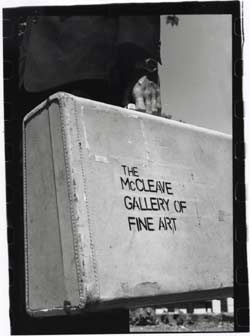June, 2002 - Present
Located in Canada - no fixed address
The McCleave Gallery began in Halifax in June, 2002, as a portable exhibition space showing the works of several local emerging artists and art students. In September 2002, it moved to Guelph , ON , serving the region as a local portable exhibition space until the Spring of 2003. In 2005, on February 26th, the McCleave gallery started its Cross-Canada Suitcase Gallery Tour which will be in effect until October 26th, 2005.
Current Contact Info:
adair@mccleavegallery.ca
michael@mccleavegallery.ca
http://www.mccleavegallery.ca
http://suitcasetour.blogspot.com
(902)880.0039
How the Project Started:
The McCleave Gallery of Fine Art is a performance-based curatorial project consisting of a portable suitcase art gallery. Established in response to the eradication of the Nova Scotia Arts Council in 2002, the original purpose of the McCleave Gallery was simply to provide much-needed exhibition space for emerging artists, at a time when such opportunities were becoming increasingly scarce.Shows, Events, Happenings:
Beginning February 26th, 2005 , the McCleave Gallery is currently commencing a cross-Canada tour encompassing the work of 14 visual artists from different regions. Beginning in Halifax , the total of 16 suitcases will be accumulated as the carriers move from east to west to north showing the work in a number of gallery and non-gallery spaces including a final show at the ODD Gallery in Dawson City , Yukon . Refer to our website for the tour schedule and a list of participating artists.
Other:
The following is the abstract for a talk that we've done at a few artist-run centres (Strutts, Articule, etc.) that serves as a bit of an elaboration on the conceptual basis of the tour.
The curator's talk that we will give for the McCleave Gallery of Fine Art Cross-Canada Suitcase Tour is intended to introduce the project, and then locate it in a historical and critical context. We will begin by outlining a short history of the gallery, including how it was founded in response to the collapse of the Nova Scotia Arts Council, its previous operation in Halifax and in Guelph , and the conception of the cross-Canada tour. Departing from an image of Francis Alys' Tourist , we will discuss how the suitcase is an emblem of tourism and thus provides a vehicle for acknowledging our own privilege as viewers and curators as we move between regions and communities. This ability to migrate is the major factor that has historically made the suitcase appealing as a tool for extra-institutional art intervention, which we will discuss in relation to Dada, the Situationists, and Fluxus. The concept of the accidental audience that was central to the Fluxus movement is one of our favorite things about the suitcase gallery. Related to Fluxus is Yoko Ono, whose concept of art as an act of offering to the audience provides a model of ‘generous performance' that is central to the McCleave Gallery.
The notion of collective art production operates in the project on a number of levels, in terms of collaboration between us and the audience, between us and the artists, between the artists themselves, and between us as individuals. These different levels of collectivity have been exploited by a number of groups throughout the history of contemporary Canadian art, including General Idea, whose Miss General Idea Pavilion acted as a spoof of ‘real' art world glamour, that functioned to reveal the power mechanisms behind the institutions that they mocked. Through the imitation-institution of the McCleave Gallery of Fine Art, we hope to make viewers reconsider the ways in which the space of the gallery or the art museum shapes their relationship with art. In doing this, we aim to create more ‘comfortable' viewing spaces, in which spectators feel free to have an experience with the art that does not fit into proscribed modes of gallery viewing.
However, it is also necessary to point out that portable exhibition spaces have an extensive history of their own, including their own aesthetic codes, which make it impossible to create portable venues that are completely ‘anti-institutional.' Also, the status of the McCleave Gallery as a reproduction of the formal or institutional gallery space must be looked at in relation to Judith Butler's point that even those who subvert dominant codes depend on those codes for their very existence. In light of this, rejecting disciplinary and political purism and embracing discursive hybridity seems like a hopeful approach for creating a purposefully imperfect and incomplete avant-garde, as the McCleave Gallery tries to do by combining elements of dominant discourses of art history, curatorial and museum studies, and social geography. In conclusion, we will show our website and the blog documenting the tour, and discuss the important role that they play in subverting a reading of the project as based on an idealized aesthetics of presence.
View All Other:
Brief/Suitcase
Everday Container
Multiple

Pearl Van Geest Invite
Jeanne Ju Invite
Kit Malo Invite
Zotz Invite